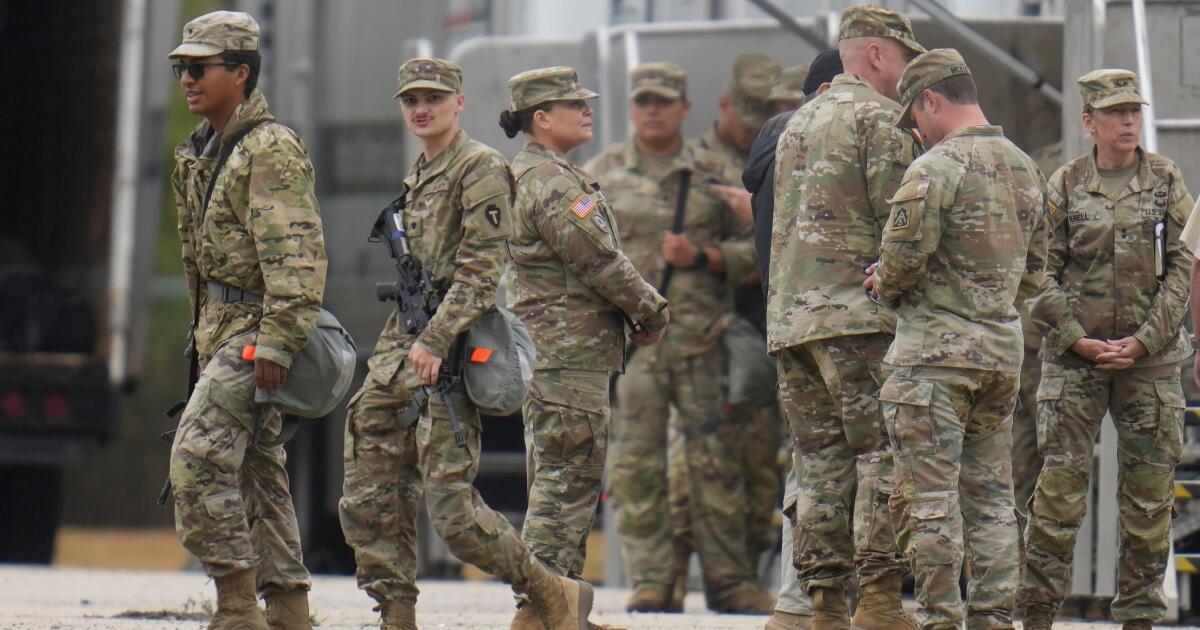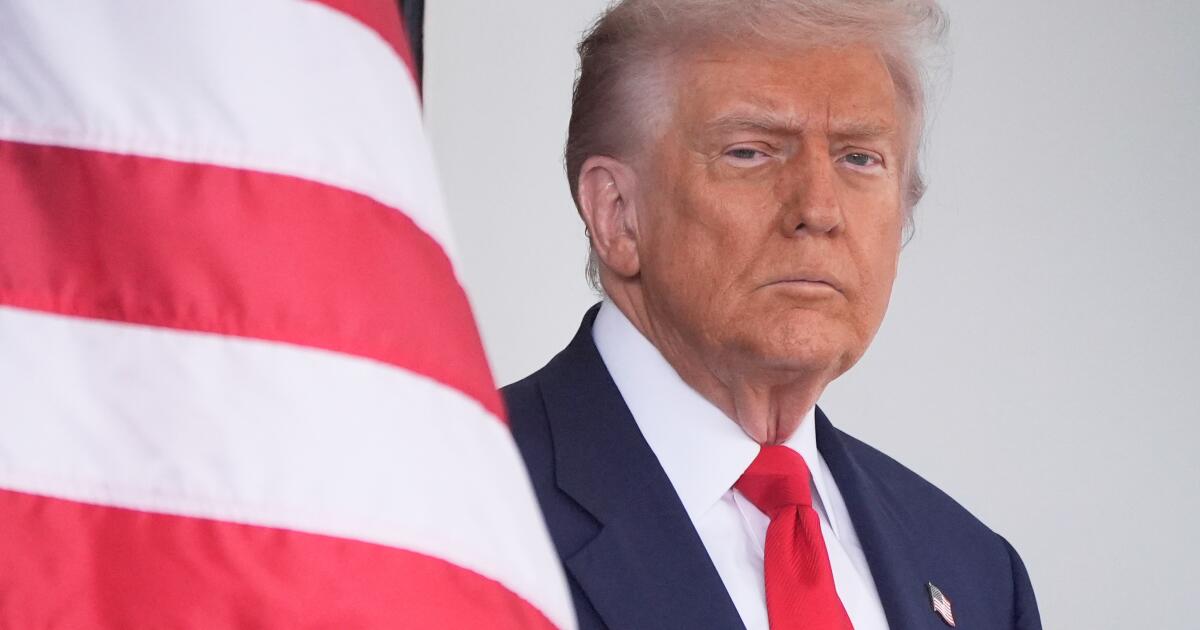Court rethinks ruling that bolstered Trump’s authority over troops
Three of the country’s most powerful judges met in Pasadena on Wednesday for a rare conclave that could rewrite the legal framework for President Trump’s expansive deployment of troops to cities across the United States.
The move to flood Los Angeles with thousands of federalized soldiers over the objection of state and local leaders shocked the country back in June. Five months later, such military interventions have become almost routine.
But whether the deployments can expand — and how long they can continue — relies on a novel reading of an obscure subsection of the U.S. code that determines the president’s ability to dispatch the National Guard and federal service members. That code has been under heated debate in courts across the country.
Virtually all of those cases have turned on the 9th Circuit’s decision in June. The judges found that the law in question requires “a great level of deference” to the president to decide when protest flashes into rebellion, and whether boots on the ground are warranted in response.
On Wednesday, the same three judge panel — Jennifer Sung of Portland, Eric D. Miller of Seattle and Mark J. Bennett of Honolulu — took the rare move of reviewing it, signaling a willingness to dramatically rewrite the terms of engagement that have underpinned Trump’s deployments.
“I guess the question is, why is a couple of hundred people engaging in disorderly conduct and throwing things at a building over the course of two days of comparable severity to a rebellion?” said Miller, who was appointed to the bench in Trump’s first term. “Violence is used to thwart the enforcement of federal law all the time. This happens every day.”
The question he posed has riven the judicial system, splitting district judges from appellate panels and the Pacific Coast from the Midwest. Some of Trump’s judicial appointees have broken sharply with their colleagues on the matter, including on the 9th Circuit. Miller and Bennett appear at odds with Ryan D. Nelson and Bridget S. Bade, who expanded on the court’s June ruling in a decision Monday that allowed federalized troops to deploy in Oregon.
Most agreethat the statute itself is esoteric, vague and untested. Unlike the Insurrection Act, which generations of presidents have used to quell spasms of violent domestic unrest, the law Trump invoked has almost no historical footprint, and little precedent to define it.
“It’s only been used once in the history of our country since it was enacted 122 years ago,” California Solicitor General Samuel Harbourt told the court Wednesday.
Attorneys from both sides have turned to legal dictionaries to define the word “rebellion” in their favor, because the statute itself offers no clues.
“Defendants have not put forward a credible understanding of the term ‘rebellion’ in this litigation,” Harbourt told the panel Wednesday. “We’re continuing to see defendants rely on this interpretation across the country and we’re concerned that the breadth of the definition the government has relied on … includes any form of resistance.”
The wiggle room has left courts to lock horns over the most basic facts before them — including whether what the president claims must be provably true.
In the Oregon case, U.S. District Judge Karin Immergut of Portland, another Trump appointee, called the president’s assertions about a rebellion there “untethered to the facts.”
But a separate 9th Circuit panel overruled her, finding the law “does not limit the facts and circumstances that the President may consider” when deciding whether to use soldiers domestically.
“The President has the authority to identify and weigh the relevant facts,” the court wrote in its Monday decision.
Nelson went further, calling the president’s decision “absolute.”
Upon further review, Sung signaled a shift to the opposite interpretation.
“The court says when the statute gives a discretionary power, that is based on certain facts,” she said. “I don’t see the court saying that the underlying decision of whether the factual basis exists is inherently discretionary.”
That sounded much more like the Midwest’s 7th Circuit decision in the Chicago case, which found that nothing in the statute “makes the President the sole judge of whether these preconditions exist.”
“Political opposition is not rebellion,” the 7th Circuit judges wrote. “A protest does not become a rebellion merely because the protestors advocate for myriad legal or policy changes, are well organized, call for significant changes to the structure of the U.S. government, use civil disobedience as a form of protest, or exercise their Second Amendment right to carry firearms as the law currently allows.”
The Trump administration’s appeal of that decision is currently before the Supreme Court on the emergency docket.
But experts said even a high court ruling in that case may not dictate what can happen in California — or in New York, for that matter. Even if the justices ruled against the administration, Trump could choose to invoke the Insurrection Act or another law to justify his next moves, an option that he and other officials have repeatedly floated in recent weeks.
The administration has signaled its desire to expand on the power it already enjoys, telling the court Wednesday there was no limit to where troops could be deployed or how long they could remain in the president’s service once he had taken control of them.
“Would it be your view that no matter how much conditions on the ground changed, there would be no ability of the district court or review — in a month, six months, a year, five years — to review whether the conditions still support [deployment]?” Bennett asked.
“Yes,” Deputy Assistant Atty. Gen. Eric McArthur said.
Bennett pressed the point, asking whether under the current law the militia George Washington federalized to put down the Whiskey Rebellion of 1794 could “stay called up forever” — a position the government again affirmed.
“There’s not a word in the statute that talks about how long they can remain in federal service,” McArthur said. “The president’s determination of whether the exigency has arisen, that decision is vested in his sole and exclusive discretion.”

